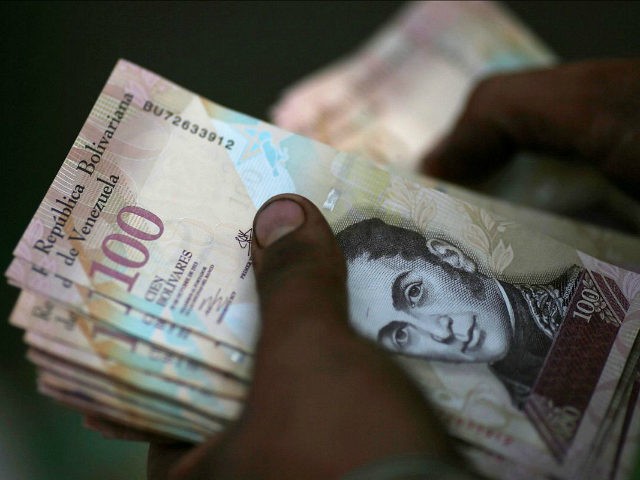The value of the bolívar, the currency of crisis-stricken Venezuela, dropped to new lows this weekend and has now lost 99.9 percent of its value against the U.S. dollar since 2010.
According to DolarToday.com, which tracks the real black market value of Venezuela currency, the bolívar fell to approximately 8,800 per dollar on Monday. Documenting the exchange rate on Dolar Today for years, Bloomberg found that Venezuelans are paying one thousand times more for a U.S. dollar than they were in 2010 using the black market rate.
Due to the government’s total control of the economy, observers consider the black market rate closer to the actual value of the currency than what the government claims it is.
This rate surfaced amid fears of further economic sanctions from the United States in response to socialist president Nicolás Maduro’s plans to create a “constituent assembly,” which critics fear will complete the country’s descent into dictatorship, as it strips elected lawmakers of their power.
The staggering rate of inflation has led to an unprecedented humanitarian crisis across the country, as people struggle to afford basic resources such as food, medicine, and sanitary products. A recent report found that over fifteen percent of Venezuelans now scavenge for food, while a majority of people go to bed hungry.
This month, the country’s socialist leader Nicolas Maduro hiked the minimum wage by fifty percent for the third time in 2017, in a bid to keep up with levels of soaring inflation.
The minimum wage now stands at 97,531 bolivars a month, which on Venezuela’s official exchange rate equates to around $65 a month but only holds a real market worth of $9.53. The government provides people with a food ticket, which has a black market value of 153,000 bolivars a month, bringing the total monthly minimum income to just under $25.
In January, the government also issued a range of new banknotes including 1000, 5,000, 10,000, and 20,000 denominations. The largest denomination was formerly 100 bolivares, which while in the past could buy someone a television or a grocery shop, is now worth less one cent. Further, the largest 20,000 denomination still only has a rapidly decreasing value of $2.27.
Venezuelan authorities strictly control the official exchange rate in an attempt to create a false illusion of wealth. According to Bloomberg, the country’s stock market appears to be valued at $2.57 trillion, making it larger than Germany’s, France’s, India’s, or Canada’s, but it has a real value closer to $3 billion.
The fall in currency was likely a response to the United States’ threat of further economic sanctions, as President Donald Trump warned last week that America would “not stand by as Venezuela crumbles” and would impose “strong and swift economic actions” should Maduro push ahead with the creation of the constituent assembly.
Trump’s statement came after the country overwhelmingly rejected the constituent assembly, which would prompt a rewriting of the Venezuelan constitution, with 98 percent of the 7.2 million Venezuelans voting against the plan. However, Maduro has downplayed the significance of the vote, describing it as “meaningless” due to its non-binding nature.
You can follow Ben Kew on Facebook, on Twitter at @ben_kew, or email him at bkew@breitbart.com.

COMMENTS
Please let us know if you're having issues with commenting.